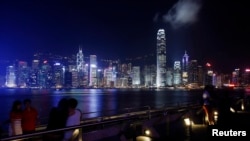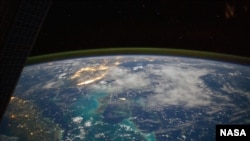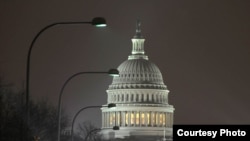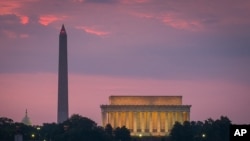Everyone who loves looking up at the night sky knows one thing: to see the most stars … get away from a city.
In cities, artificial light comes from street lamps, buildings, signs and cars. All this unnatural, man-made light blocks out any chance to see the stars.
In Washington, D.C. a man named Jim Dougherty is fighting for darker skies. He and others want to turn down the lights in the city and not just to improve stargazing. They believe a darker night sky is good for the health of people and our planet.
What does Earth look like from space?
The Earth appears to shine from space. What astronauts see as they circle the planet are the lights from our cities. This light creates a kind of orange cloud or haze that keeps us from seeing the stars.
Jim Dougherty is president of the International Dark Sky Association. He says the orange haze is light pollution.
“Light pollution is outdoor lighting that’s not serving the task that it's designed for. In fact it is either wasted or, worse, has harmful, adverse effects.”
Jim Dougherty says too much light is bad for your health. Studies find too much light disturbs our sleep, affects hormones and is linked to some cancers. He says light pollution is also bad for the planet.
“There’s a direct connection between the needless and harmful lighting and the excess generation. And it's also a big climate issue. We’re worried about climate change. We're (are) just putting carbon dioxide up there. If we are burning natural gas or we’re burning coal, we’re causing global warming by sending light straight up into the sky.”
Light pollution versus public safety
But how much light is too much?
Mr. Dougherty went to a popular Washington neighborhood called Capitol Hill. In this area, round or globe-shaped street lights shine in all directions. He says too much light is being produced. But some people who live on Capitol Hill disagree.
VOA reporter Rosanne Skirble spoke with two people out for a casual, evening walk.
“It makes me feel safe, and I definitely feel like I can see all around me. I know no one is going to, like, hurt me or anything like that. It’s just comforting.”
“The area around here is nice. It’s populated. So the lighting is a good amount. It’s not too bright and it’s just the right setting for a romantic mood.”
Jim Dougherty says he understands that Washington city officials want to make the sidewalks safe. But he says the city set up two times the number of street lamps than were necessary. And he says the lights are not designed well. They send light into the sky, where it is not needed. He says the street lamps are more for looks than safety.
“The fact is the right amount of light is the right amount of light, and if you double it then you do not increase the public safety benefit, but you do increase the cost. You increase the energy use. You increase the climate impacts and the health effects. So, this is a classic example of over-lighting.”
On their visit to the Capitol Hill, he and reporter Rosanne Skirble go to the grounds of a large apartment building. The grounds are lit by a combination of traditional lights that brighten, or illuminate, the grounds and walls. There are also more modern lamps that send light downward in one place where it is needed.
In the recent past, the Capitol Hill neighborhood had its share of crime. It still has reports of robbery, home break-ins and murder.
Ways to light our cities without causing light pollution
There are signs of new lighting on the wide streets near the United States Capitol building. Jim Dougherty says that soon streetlights will not be necessary. But he says efficient lighting for sidewalks provide safety without wasting energy or causing light pollution.
“Pretty soon in streets now we are not going to need streetlights because car headlights have become so bright. They are so effective. We use illuminated systems, paint stripe markers and reflectors. So, we really don’t need street lights. But we will need sidewalk lighting. They are lower. They are dimmer. They are more efficient, and they get the job done without wasting all that money and all that energy.”
With knowledge comes action, he says. He explains that city officials are taking steps to stop wasteful spending and protect public health.
“In some communities, they are adopting new technologies that they dim the lights, after say 1 a.m., when people don’t really need it. So that's an important way to save. There are also developing technologies now when you step into a park or when you drive your car down a street, the lights come on because they have motion sensors. Or they sense your cell phone. They come on when there is someone there and then they turn off.”
A motion sensor turns lights on or off by detecting motion. Motion sensors can reduce lighting by 90 percent and still be effective. Mr. Dougherty hopes more communities use energy-saving devices like this. He says he hopes that in the future, we humans can reclaim the night sky.
I’m Anna Matteo.
What is the night sky like where you live? Are you lucky enough to see the stars? Or do you live in a city that has lots of light pollution? Let us know in the comments section.
"Blackout City" is a film from Nicholas Buer. The film shows what the night sky would look like without light in London.
Rosanne Skirble reported this story from Washington, D.C. Anna Matteo wrote it for VOA Learning English. George Grow was the editor.
______________________________________________________________
Words in this Story
artificial – adj. not natural or real; made, produced, or done to seem like something natural
stargazing – n. the act of looking at or studying the stars
globe – n. a round object
illuminate – v. to supply (something) with light; to shine light on (something)
haze – n. dust, smoke, or mist that has filled the air so that you cannot see clearly
disturb – v. to upset the natural and especially the ecological balance or relations of something
reclaim – v. to get back (something that was lost or taken away)










